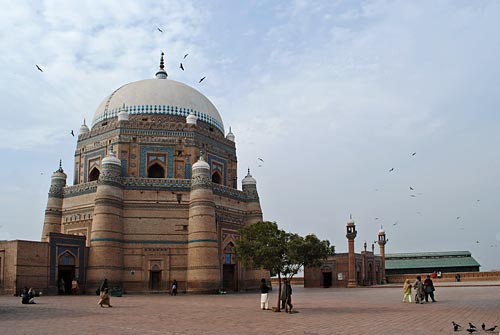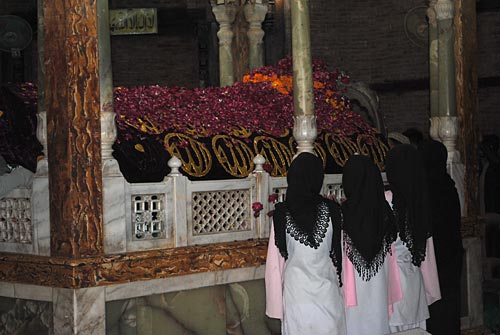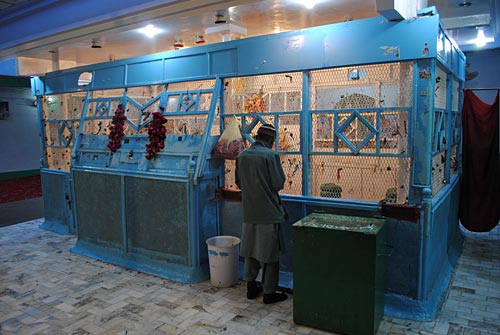
Shah Rukn-e Alam, Multan
Sufism is a mystical movement within Islam that seeks to find divine love and knowledge through direct personal experience of God. It consists of a variety of mystical paths that are designed to ascertain the nature of mankind and God and to facilitate the experience of divine love and wisdom in the world. Sufism arose as an organized movement after the death of Muhammad (AD 632), among different groups who found orthodox Islam to be spiritually stifling. The practices of contemporary Sufi orders and suborders vary, but most include the recitation of the name of God or of certain phrases from the Qu'ran as a way to loosen the bonds of the lower self, enabling the soul to experience the higher reality toward which it naturally aspires. Though Sufi practitioners have often been at odds with the mainstream of Islamic theology and law, the importance of Sufism in the history of Islam is incalculable. Sufi literature, especially love poetry, represents a golden age in Arabic, Persian, Turkish, and Urdu languages.
Sufi philosophy is universal in nature, its roots predating the arising of Islam and the other modern-day religions; likewise, some Muslims consider Sufism outside the sphere of Islam, although generally scholars of Islam contend that it is simply the name for the inner or esoteric dimension of Islam.
A practitioner of this tradition is generally known as a ṣūfī, though some adherents of the tradition reserve this term only for those practitioners who have attained the goals of the Sufi tradition. Another name used for the Sufi seeker is Dervish.
Sufism has a strong tradition in Pakistan. The Muslim Sufi missionaries played a pivotal role in converting the millions of native people to Islam. As in other areas where Sufis introduced it, Islam to some extent syncretized with pre-Islamic influences, resulting in a religion with some traditions distinct from those of the Arab world. The Naqshbandiya, Qadiriya, Chishtiya and Suhrawardiyya silsas have a large following in Pakistan.
A Dargah is a Sufi shrine built over the grave of a revered religious figure, often a Sufi saint. Local Muslims visit the shrine known as (ziyarat). Dargahs are often associated with Sufi meeting rooms and hostels. They may include a mosque, meeting rooms, schools (Madrassas), residences for a teacher or caretaker, hospitals, and other buildings for community purposes. The term is derived from a Persian word, which can mean, among other uses, "portal" or "threshold". Many Muslims believe that dargahs are portals by which they can invoke the deceased saint's intercession and blessing.
For more detailed information consult the Wikepedia article on Sufism.

Shah Rukn-e Alam, Multan
Multan
Mausoleum of Hazrat Bahuddin Zakriya
Mausoleum of Shah Rukn-e-Alam
Mausoleum of Shah Shams Tabriz
Bad-Shahee Mosque
Baba Buley Shah
Hazrat Muhammad Shah Yusaf Gardez
Sukkur
Shrine of War Mubarak
Shrine of Sadruddin Badsha
Shrine of Khwaja Khadir ( The ‘Green Man’)
Lahore
Data Darbar Shrine
Mausoleum of Dadaji Ganjbaksh
Mausoleum of Hazrat Mian Mir
Mausoleum of Shah Inayat Qadiri Shatari
Bibi Paak Daaman / Shrine of Ruqayah bint Ali
Karachi
Shrine of Mangho Pir
Shrine of Abdullah Shah Ghazi
Sehwan
Shrine of Lal Shahbaz Qalandar
Shergarh
Shrine of Shaikh Daud Bandagi Kirmani
Garh Maharajah
Mausoleum of Sultan Bahu
Bhit, Sindh
Shah Abdul Latif Bhitai
Khyber Pakhtunkhwa Province
Rehman Baba

Shrine of Sadruddin Badsha, Sukkur
 Martin Gray is a cultural anthropologist, writer and photographer specializing in the study of pilgrimage traditions and sacred sites around the world. During a 40 year period he has visited more than 2000 pilgrimage places in 165 countries. The World Pilgrimage Guide at sacredsites.com is the most comprehensive source of information on this subject.
Martin Gray is a cultural anthropologist, writer and photographer specializing in the study of pilgrimage traditions and sacred sites around the world. During a 40 year period he has visited more than 2000 pilgrimage places in 165 countries. The World Pilgrimage Guide at sacredsites.com is the most comprehensive source of information on this subject.For additional information on sacred sites in Pakistan: